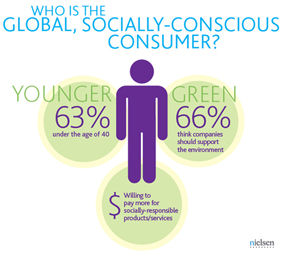Global consumers will pay more for ethics

46% are now willing to pay extra for products and services from companies that show a commitment to social responsibility
How important is corporate citizenship? Nearly half of global consumers (46%) are willing to pay extra for products and services from companies that show a commitment to social responsibility through their campaigns and programs according to Nielsen’s 2012 Global Corporate Citizenship Survey. Those respondents also prefer to work for these companies (62%) and invest in these companies (59%).
"It’s clear that corporate social responsibility efforts resonate with a specific group of consumers," said Nic Covey, VP of Nielsen Cares, Nielsen’s global corporate social responsibility program. "Marketers need to know who those consumers are in order to maximize the social and business return of their cause marketing efforts. This understanding allows brands to engage in social impact efforts that appeal to the right consumers with the right causes and through the right channels."
Nielsen drew on a list of 18 causes that included the U.N.’s Millennium Development Goals and prominent corporate social responsibility topics.
The online survey—conducted between August 31 and September 16, 2011—polled more than 28,000 consumers in 56 countries across Asia Pacific, Europe, Latin America, the Middle East, Africa and North America.

Some of the key findings:
- Consumers in Asia Pacific (55%), the Middle East and Africa (53%) and Latin America (49%) are more willing to pay extra for products and services from socially-responsible companies than consumers in North America (35%) and Europe (32%).
- As for brand intelligence, socially conscious consumers trust recommendations from people they know (95%) and look for opinions and information posted by other consumers online (76%), and are more likely to use social media to help make purchase decisions (59% vs. 46% of all respondents).
- "Knowing what causes are most important to the socially-conscious consumer may help brands prioritise their social investments. The next step is to understand precisely what causes are important to a brand’s individual customers," said Covey.
- Sixty-three percent of these "socially-conscious consumers" are under age 40, and consult social media about making purchase decisions and their priority causes are environment, education and hunger.
- Of 18 specific causes, socially-conscious consumers prioritize environmental sustainability at 66%, improvements to science, technology, engineering and math education 56% and elimination of extreme poverty and hunger 53%.
"Not all consumers expect companies to care about social responsibility," states Nielsen’s blog post on the study, "but those that do can be segmented and understood in ways that allow brands to engage in cause marketing that appeals to the right consumers, supports the right causes and engages the right marketing channels."
Among the causes that Nielsen polled respondents: eradicating extreme poverty and hunger; promoting gender equality and empowering women; environmental sustainability; and more.
Download the report for more details
Valere Tjolle
FREE and Special Offers on sustainable tourism information for destinations, tour operators, travel agents, hotels, tourist attractions, colleges and universities HERE
Special offer this week HERE
 United Kingdom
United Kingdom United States
United States Asia Pacific
Asia Pacific












































Dozens fall ill in P&O Cruises ship outbreak
Turkish Airlines flight in emergency landing after pilot dies
Boy falls to death on cruise ship
Unexpected wave rocks cruise ship
Woman dies after going overboard in English Channel